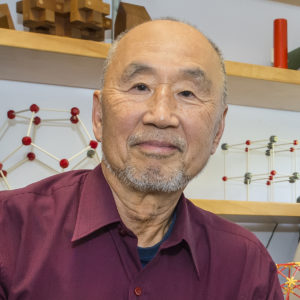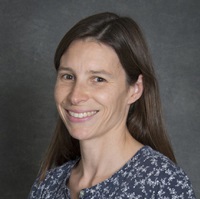Two scientists from the Biosciences Area, Sung-Hou Kim and Susannah Tringe, have been named Fellows of the American Association for the Advancement of Science (AAAS). They join fellow Lab scientists Allen Goldsten, faculty scientist in the Energy Technologies Area, and Kathy Yelick, associate laboratory director of Computing Sciences, in receiving the distinction of Fellow this year for “their scientifically or socially distinguished efforts to advance science or its applications.”

Kim, a faculty affiliate in the Molecular Biophysics & Integrated Bioimaging (MBIB) and Environmental Genomics & Systems Biology (EGSB) Divisions, was recognized for his “landmark discovery of the structures of t-RNA, H-Ras and B-Raf, and for the mapping of the protein structure and genome sequence universes.” Kim first joined Berkeley Lab’s Structural Biology Division as a faculty senior scientist in 1979. Currently, he is a professor of graduate studies and professor emeritus in UC Berkeley’s Department of Chemistry, and a faculty member of UC Berkeley’s Center for Computational Biology.
His major research interests have been in two areas: structural biology and computational biology. With respect to the former, Kim’s group made landmark discoveries of the 3D structures of a transfer-RNA, a decoder of genetic codes, and two major cancer-causing proteins coded by the mutants of Ras and Protein kinase genes. The 3D structure of the latter helped Plexxikon Inc. in its discovery of Zelboraf, an anticancer drug. Kim’s second area of focus has been to develop methods for visualizing “the protein structure universe” to understand the architectural patterns of all protein structures, and constructing “The Genome Tree of Life” to find a narrative for the evolution of all living organisms based on the whole genome sequence universe.
 Tringe is the DOE Joint Genome Institute’s Deputy for User Programs and Microbial Systems Group Lead, as well as a researcher in the EGSB Division. Tringe was recognized for her “distinguished contributions to the study of microbial genomics, particularly in connection to plant microbiomes, and for leadership in providing community access to biotechnology resources.”
Tringe is the DOE Joint Genome Institute’s Deputy for User Programs and Microbial Systems Group Lead, as well as a researcher in the EGSB Division. Tringe was recognized for her “distinguished contributions to the study of microbial genomics, particularly in connection to plant microbiomes, and for leadership in providing community access to biotechnology resources.”
The Microbial Systems Group focuses on sequence-based approaches to studying microbial community assembly, function, and dynamics. Tringe’s research interests include terrestrial carbon cycling, particularly microbial factors influencing methane fluxes at terrestrial-aquatic interfaces, and the contributions of plant microbiomes to stress resistance.
For more, read the Berkeley Lab News Center press release.




